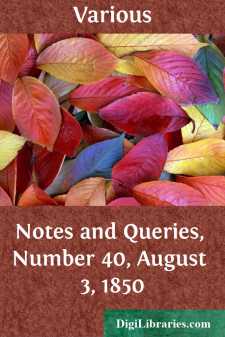Categories
- Antiques & Collectibles 13
- Architecture 36
- Art 48
- Bibles 22
- Biography & Autobiography 813
- Body, Mind & Spirit 142
- Business & Economics 28
- Children's Books 14
- Children's Fiction 11
- Computers 4
- Cooking 94
- Crafts & Hobbies 4
- Drama 346
- Education 46
- Family & Relationships 57
- Fiction 11829
- Games 19
- Gardening 17
- Health & Fitness 34
- History 1377
- House & Home 1
- Humor 147
- Juvenile Fiction 1873
- Juvenile Nonfiction 202
- Language Arts & Disciplines 88
- Law 16
- Literary Collections 686
- Literary Criticism 179
- Mathematics 13
- Medical 41
- Music 40
- Nature 179
- Non-Classifiable 1768
- Performing Arts 7
- Periodicals 1453
- Philosophy 64
- Photography 2
- Poetry 896
- Political Science 203
- Psychology 42
- Reference 154
- Religion 513
- Science 126
- Self-Help 84
- Social Science 81
- Sports & Recreation 34
- Study Aids 3
- Technology & Engineering 59
- Transportation 23
- Travel 463
- True Crime 29
Notes and Queries, Number 40, August 3, 1850
by: Various
Categories:
Description:
Excerpt
NOTES.
TRANSLATIONS OF JUVENAL—WORDSWORTH.
Mr. Markland's ascertainment (Vol. i., p. 481.) of the origin of Johnson's "From China to Peru," where, however, I sincerely believe our great moralist intended not so much to borrow the phrase as to profit by its temporary notoriety and popularity, reminds me of a conversation, many years since, with the late William Wordsworth, at which I happened to be present, and which now derives an additional interest from the circumstance of his recent decease.
Some mention had been made of the opening lines of the tenth satire of Juvenal:
"Omnibus in terris, quae sunt a Gadibus usque
Auroram, et Gangem pauci dignoscere possunt
Vera bona, atque illis multum diversa, remotâ
Erroris nebulâ."
"Johnson's translation of this," said Wordsworth, "is extremely bad:
"'Let Observation, with extensive view,
Survey mankind from China to Peru.'
"And I do not know that Gifford's is at all better:
"'In every clime, from Ganges' distant stream,
To Gades, gilded by the western beam,
Few, from the clouds of mental error free,
In its true light, or good or evil see.'
"But", he added, musing, "what is Dryden's? Ha! I have it:
"'Look round the habitable world, how few
Know their own good, or, knowing it, pursue.'
"This is indeed the language of a poet; it is better than the original."
The great majority of your readers will without doubt, consider this compliment to Dryden well and justly bestowed, and his version, besides having the merit of classical expression, to be at once concise and poetical. And pity it is that one who could form so true an estimate of the excellences of other writers, and whose own powers, it will be acknowledged, were of a very high order, should so often have given us reason to regret his puerilities and absurdities. This language, perhaps, will sound like treason to many; but permit me to give an instance in which the late poet-laureate seems to have admitted (which he did not often do) that he was wrong.
In the first edition of the poem of Peter Bell (the genuine, and not the pseudo-Peter), London, 8vo. 1819, that personage sets to work to bang the poor ass, the result of which is this, p. 36.:
"Among the rocks and winding crags—
Among the mountains far away—
Once more the ass did lengthen out
More ruefully an endless shout,
The long dry see-saw of his horrible bray."
After remarks on Peter's strange state of mind when saluted by this horrible music, and describing him as preparing to seize the ass by the neck, we are told his purpose was interrupted by something he just then saw in the water, which afterwards proves to be a corpse. The reader is, however, first excited and disposed to expect something horrible by the following startling conjectures:—
"Is it the moon's distorted face?
The ghost-like image of a cloud?
Is it a gallows these pourtrayed?
Is Peter of himself afraid?
Is it a coffin—or a shroud?
"A grisly idol hewn in stone?
Or imp from witch's lap let fall?
Or a gay ring of shining fairies,
Such as pursue their brisk vagaries
In sylvan bower or haunted hall...?












